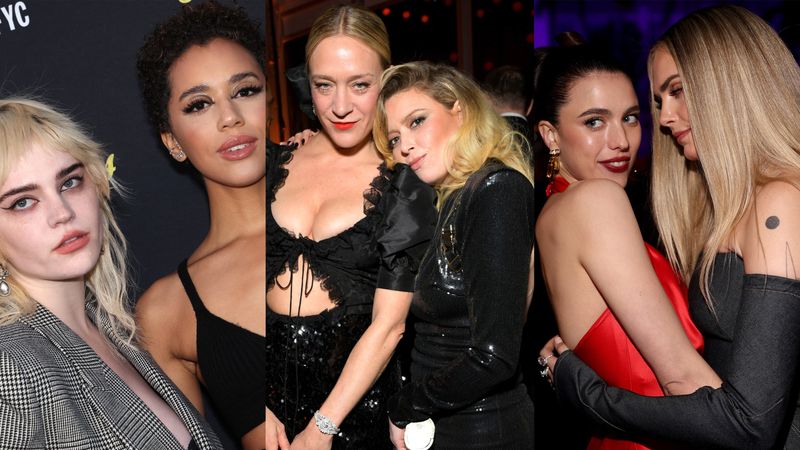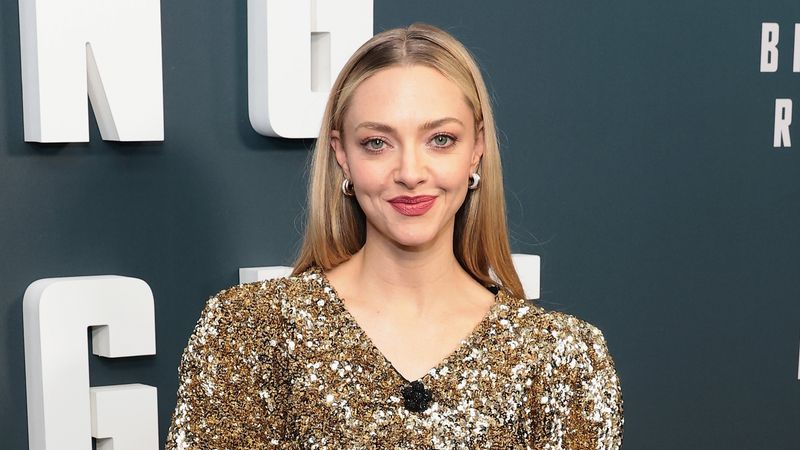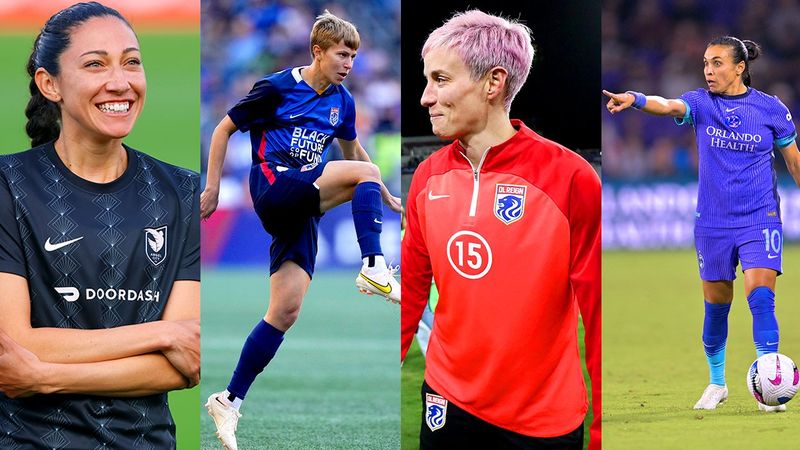A pioneering filmmaker for her 1993 lesbian themed film Claire of the Moon, Nicole Conn still really just wants to tell a great love story. And at this point in her career she has succeeded in doing just that -- certainly with her most recent feature Elena Undone, a story of forbidden love for modern times, and perhaps most magnanimously with her acclaimed 2005 documentary Little Man, about the birth of her micro preemie son Nicholas, whom she had with her former partner.
An author, screenwriter and producer as well as a director, these days Conn’s life is teeming with movie-style romance with her new love and soul mate – as she will tell you—photographer Marina Rice Bader. Their meeting, falling in love and discovery that they are indeed soul mates is loosely chronicled in last year’s festival darling of a film, Elena Undone, a sexy, thoughtful film about a woman whose married to a rigid pastor but finds true love with a free-thinking artistic woman.
With Elena now available on DVD, Conn has turned her focus to her next project – A Perfect Ending, described as a “comedy of errors” that ends up as an “erotic journey.” From the days of grassroots fundraising for Claire of the Moon, when Conn says women would write big checks in part for the history-making act of getting a lesbian film off the ground, to the ultra-savvy, if not jaded, era of internet fundraising, Conn has come full circle with a robust Kickstarter campaign for A Perfect Ending. And with her ability to adapt to the industry's changes, she is keeping busy with film projects.
SheWired chatted with Conn about finding true love, casting those two gorgeous leads in Elena, why she's not in the Guinness Book of World Records yet for Elena’s record-breaking kiss, the challenges of producing a film since she made Claire of the Moon 20 years ago and why it’s imperative that lesbians get out to the movies to support the films they want to see.
First off, congratulations on Elena Undone’s success!
Thank you!
What was the impetus for the film's plot about a woman who is married to a pastor and finds love with a creative woman?
When Marina and I met, she had never ever been with a woman, never even considered being with a woman, and had never even remotely thought about kissing a woman.
It was just completely as foreign to her as it is for Elena. The story is loosely based on our relationship. Marina’s husband was very Republican, religious, involved with the church--he’s not a pastor -- but it’s sort of based on the way we met. Never in a million years would she consider being with a woman when she met me and we truly believed that we had met our soul mate.
Being a lesbian, I had been around the block way too many times, but had fallen in love in a way that was completely unique to me.
How did you decide that the story of your relationship would become the subject of your next film?
She asked me “Why aren’t there more lesbian movies?”
Nicole Conn, Marina Rice Bader
That’s a slippery slope. What is easy answer to that question?
“Oh my God,” how long do you have to sit here and listen to this crap, ya know?
For me as a filmmaker, it feels like there are so many scarcity issues.
There’s no funding, and at the end of the day, women do not support theatrical releases, which is what gives films their push into light. So it’s very hard to get films off the ground. Thank God for the festivals, or we would never be seen theatrically, unless you have A-listers like Annette Bening and Julianne Moore.
Really? Women don’t support theatrical releases? That seems hard to believe considering all of the feedback we get on our site about lesbian movies.
I was stunned - I did a panel a few years ago, and the statistics were that gay men went once a month to theaters, straight couples went six times a year, and lesbians don’t go even once a year.
Was there the explanation for the statistics citing that lesbians don’t go out to the movies?
The general lesbian is a nester. And the way she uses movies is either as a date night at home, or she will go to a multiplex and see an action/adventure movie just as much as an art house theater film.
They probably think they support lesbian cinema because they buy DVDs, but they don’t understand the theatrical release component, and how people get word-of-mouth reviews and all that other stuff.
More on next page...
\\\
(continued)
That’s very interesting. I don’t know that I’ve thought about the importance of actually going to the cinema because I usually just happen to go anyway.
I was explaining this to Marina, and she said, “Why don’t we just make our own?”
Another slippery slope… What did you say?
I said, “Oh God, I don’t want to do another lesbian movie…”
I basically said the only story that really interests me is ours because it’s so unique to me that you fell in love with a woman at the age of 50, and never could have conceived of that happening.
So, with that in mind, and we had had an investor who had seen Claire of the Moon who wanted to put up some money… We put up some of our own money and decided, “Ok, lets just do this, and we’ll do it on a low budget.”
Nicole
How did it work out keeping on the low budget?
At that time, when I talked to Wolfe Video, I asked where people break even on lesbian cinema.
What was the answer?
As long as it’s made for $250,000 and less…
Long story short, Elena Undone was really a labor of love based on the fact that I thought the story that Marina had was so compelling, and I just happened to be a part of it because I was the one that she fell in love with.
Regarding Elena, and this is trivial, are you in the Guinness Book of World Records yet for the longest screen kiss?
No, but we should be, damn it! As soon as I have an actual free second, I am going to see how you go about submitting because, when I did the research for it… And it truly was not about making a record-breaking kiss; it was about how does that first indescribable, yummy first kiss feel. It does feel like it lasts forever, and feels like it’s just this wonderful choreography of deliciousness.
So, I thought what is the longest kiss? The longest kiss record was held from years back – 1941 Jane Wyman and Regis Toomey in You’re In the Army Now. I was stunned to find that nobody had ever tried to break that, but I figured out why when we did rehearsals.
It was like, "Wow, kisses really can’t last that long and maintain interest."
But when I talked to the girls about it and we decided we were going to steady-cam it and try to keep it as dynamic as possible, they were totally up for the challenge.
You landed two beautiful and charismatic leads. How did you come to cast Traci Dinwiddie and Necar Zadegan?
They had worked together with our producer Jane Clark in a three-minute short called The Touch. They worked together for a day on that, and Jane had mentioned that they had really great chemistry.
But in my mind, when I wrote the role of Marina, there was no ethnicity...
Traci Dinwiddie, Necar Zadegan
It was probably one of things where you didn't picture her outside of how you knew her.
I never thought about Necar, but I knew immediately that I wanted to read Traci because I had seen some of her other work, so all along she was sort of the linchpin. She was either going to be Elena or Peyton, although she always felt like Peyton to me.
Poor Traci ended up essentially having to read both roles for almost a month. We had over 1,200 submissions and 40 women in callbacks. Literally, the last afternoon – it was kind of a movie moment – Jane said, “Will you just read Necar?”
I said, “Yeah, I’ll read her, but I am not going to cast her.”
She walked into the room, and Traci had just ended up kissing like ten different women as Peyton or Elena, and she was in the bathroom freshening up. We were giggling about what to do to find a good-looking woman who’s got chemistry with her. Then Necar walked in --her hair was just wild and crazy -- turned around and said, “Hi, I’m Necar.” I literally just said, “Fuck! You are so fucking beautiful!” It was one of those moments where I was so unedited, and Marina was sitting next to me and it really pissed her off! We didn’t speak almost the rest of the night.
More on next page...
\\\
(continued)
Really?
Yes! She basically said, “I’ve never been with a woman, and I never thought I’d be jealous because I was never jealous with men, but it really affected me that you thought she was so damn beautiful.”
We joke it about it now because we consider Necar our kid sister, and we’re really great friends. That first moment was just very, very tense.
Then we read them, and I said, “Oh my God, I’ll re-write her.” So that’s how that came to be. The two of them just really embodied the characters.
Did making your documentary Little Man, about your son Nicholas, help shape your work in Elena in any way?
It did in a lot of ways. I learned so much making Little Man because it was a two and a half year project. I worked on editing it endlessly, and worked with probably 15 different editors throughout that time. My final editor taught me so much about cutting different ways -- how to move things faster, and cutting and things along those lines. It really shaped me, and not just humanistically. It shaped my filmmaking in a pretty huge way.
The other thing about it is that after I put my soul out there on celluloid, I just felt like after that I don’t care if someone doesn’t like a film or does like a film. Claire of the Moon-- I had to go to therapy for two years after, but after Little Man, it was like what’s important in life is this little boy is alive.
So, my mission as a filmmaker is to make films that people are entertained by, or provoked by, but mostly that they feel by, and I don’t really care about the reviews anymore and that sort of freed me from that stand point.
At what point did you decide to chronicle Nicholas’ journey as a preemie?
I was actually doing a documentary about surrogacy, because of the surrogate that was carrying the last of the frozen embryos that Gwen (Nicole’s former partner) and I had.
We had to go through surrogacy because Gwen just couldn’t handle another pregnancy, and I can’t do pregnancy. I can do embryos but I can’t actually carry. So, we were stuck with either we were going to adopt, or go with the rest of all these frozen embryos that we had. It also made me want to ask a lot of questions about society. Who are we that we think we can rent out human bodies, and do this? Are we so narcissistic?
That is a fascinating question to attempt to answer…
I wanted to really investigate that for this documentary about surrogacy. Then my surrogate ended up having this medical condition that nobody knew that she already had, and the baby came early.
It was really a life or death situation. My brother, who was an associate producer, was shooting and chronicling during the time that Nicholas was in this life or death jeopardy --during the first few months he was shooting all of this footage. I didn’t care about anything filmicly.
Three and a half months into the hospital stay, Nicholas had a really good day, and I came home early one afternoon and he (Nicole’s brother) said, “You have got to look at this footage, because I think you’re going to decide you want to tell this story.” I looked at the footage, and thought, “It is a story I want to tell.”
What type of issues were you hoping to investigate once you saw the footage?
We have this technology…should we be using it? At what cost are we using it? I really wanted to ask the hard questions and do it honestly. Basically, really say, we are having the same “saving lives” question we do at the end of life, now at the beginning of life, and we are saving these babies earlier and earlier.
They are having more and more disabilities because a baby has to bake for so long before it should come out of the womb. Now we have all of these children that are like Nicholas, I know he is a severe case, but I am talking to moms everyday who see Little Man and email me, and their kid has been saved at 20 weeks, and 21 weeks. Where does the line stop? It is sort of one of those things that fascinates me philosophically, spiritually…
The second part of it became very critical for me because once the film had gone out I ended up getting letters from so many preemie parents who said, “thank you” for showing the world what we go through and what our children go through.
That’s great!
Yeah, I am very happy about that. I get far more fan mail from Little Man than from all my other projects together.
Little Man was personal for you and I now know that Elena Undone was inspired by your life. Claire of the Moon was about writers. Is it safe to guess that you were somehow represented by one of the characters?
It was sort of a story about the first straight woman I fell in love – the Claire character. I was a novice filmmaker and didn’t know what the heck I was doing. The only thing I really wanted to try to do with that film was sort of capture the nuance of that first time you fall in love with a woman.
I think from that standpoint it’s fairly successful. From all other stand points, filmically, there are so many things wrong with it. I’m the first one to point out every one of those things, but I tell you, I still get so many emails and letters from young lesbians who just love that movie.
What were the challenges in making a lesbian themed film back then as opposed to now
I will tell you one thing. It was so much easier for me to raise money for Claire of the Moon than it has been for anything else, and I think the reason is that there was nothing else, literally nothing else. There hadn’t been anything since Desert Hearts, which came out in ’87.
It literally had been like a six-year dry spell for lesbians. When the film came out I had no idea that it was going to create such furor among political lesbians who wanted it to be a political statement message movie, as opposed to what I wanted it to be, which was just a romance. I didn’t realize there were so many political implications. I got great rave reviews from straight press, and was just creamed in the lesbian press.
I got LA Critic’s Pick of the Week, and then San Francisco was killing me --clobbering me. It was sort of one of those things where I just didn’t understand the importance of a film when a community doesn’t have a film, because I was just looking at it from my own narrow point, which was, “I want to tell a love story.”
Now, 20 some odd years later, my mantra is still, “romance is not a dirty word.” People ask why the coming out story, and my answer is still the same: its always the most interesting one, it is the most exciting one. When you fall in love with a woman for the first time, I think its really just the most highly charged. We all remember those, and I think that that is why they speak to people so much.
What was it like trying to fund a lesbian movie back then?
I literally had women who would just write checks for $25,000. They were just, “Here, make the movie. Let’s be part of history.”
More on next page...
\\\
(continued)
Lately it seems that everyone is trying to get a project off the ground with things like Kickstarter, which you are using for your next project A Perfect Ending. It’s great that such a tool exists but there are just so many projects out there now. It has to be tough for people to decide where to put their money.
It's so unreal that because of the internet, and making this level playing field where anybody can go get a hi-def camera and become a filmmaker, and you have all these downloadable things, which create this need for content, pretty much anybody can become a filmmaker.
When you actually have to go try to raise the money to make a film, everybody’s become jaded, and it’s become very difficult to actually make money in our particular niche audience.
It was Marina’s idea to do the Kickstarter for A Perfect Ending and I said, “This isn’t going to work. Lesbians don’t part with their money -- trust me.” And she did prove me wrong. But she had to work around the clock 24/7, and quite a few other people along with her, to make that happen.
Your Kickstarter campaign for A Perfect Ending is quite robust.
The exciting thing is that we’re creating this tribal community. We are hoping that we are giving the Kickstarter donors such a fun time that they will come back and do it again and tell their friends, “Hey, put $5 in, you get all the exclusive footage first.” Because they get to see everything before anybody does. They get very excited, and you know how rabid lesbians can be [laughs].
Yes I do!
They really feel like they are part of the process, and they are!
Will you be Flip-camming behind-the-scenes stuff that you can post really easily?
Absolutely! I mean, people look at this content. Well, who doesn’t want to look at Jessica Clark? And Barbara Niven as well? We’ve gotten quite a few older lesbians saying thank you for casting a woman who is a little older. For me the social media has become a whole new thing in my head. I used to just think of it as a necessary evil, and now it’s just the absolute platform in which to be able to keep a community involved, and hopefully have them help you keep creating product for them
Because you were one of the first to make a lesbian-themed film in… I’m forgetting what year that was.
Well, Desert Hearts came out in ’87, I shot Claire of the Moon in ‘91 and it was a general release in ’93.
Wow, I felt like it was late 80’s.
No, it wasn’t actually. A lot of people have that thought that, but we shot it in October of ’91, and it ran in theaters for 18 months. It just never shut down. It would run weeks in a row because lesbians had nothing – that was the only game in town.
The film did amazing theatrically. We only had 12 prints that just kept roving around the country.
How were you able to keep it out there for so long?
I did the Making of…, a soundtrack, t-shirts, all that stuff, and that is what propelled it to being able to keep going.. It was just really weird because there was nothing else out there, so the Making of Claire of the Moon became this huge other piece, And then I did the book, which went into about 15 re-prints. It was just one of those things that became a cottage industry of its own.
As a pioneer, of lesbian filmmaking, were there movies that inspired you back then?
Desert Hearts. I was just stunned by that movie. It was like, “Oh my God, this is truly it.” I bow to Donna Deitch having done that film and being so brave with the whole thing. My other favorite film has no sex in it at all. Entre Nous. it’s a French film.
I loved that movie! I ran out and rented the video back in the day when I was seeking out lesbian images on film.
I just love that movie. It’s just such a beautiful story, and so well acted and so well crafted. One of my recent favorites is Fire. Again, there is not a lot of sex but the performances are so strong and I totally buy the attraction between the women.
I imagine there are women who are adding Elena to their lists of favorite lesbian films. From the feedback we’ve been able to track on SheWired it appears that women are really moved by it.
That is what we are hoping to do. It goes back to how I am not a political filmmaker. I just want to make beautiful love stories. I just wish we could get back to the place where seeing a good old fashioned love story is ok.
Be SheWired's Friend on MySpace!







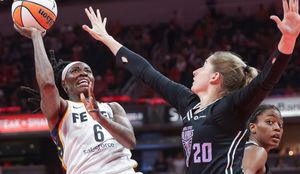






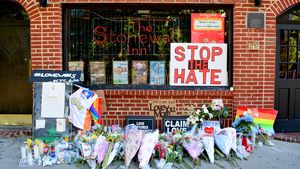






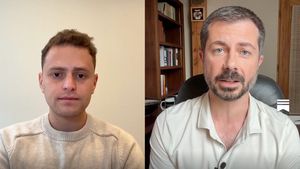



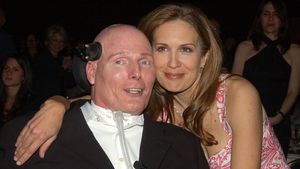


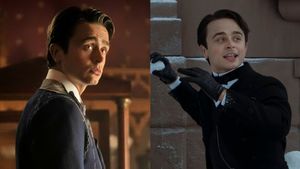
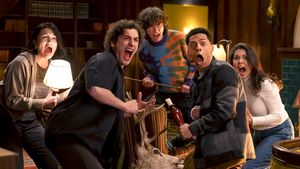












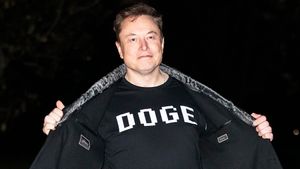


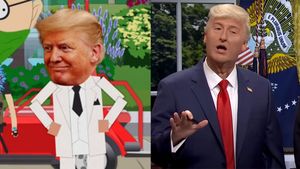
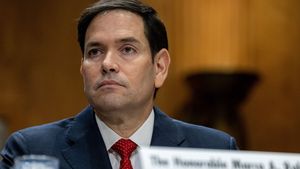


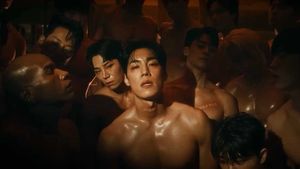






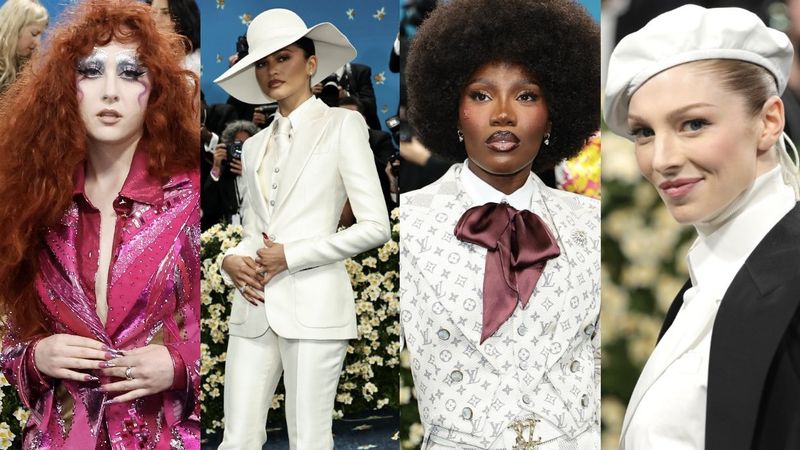



































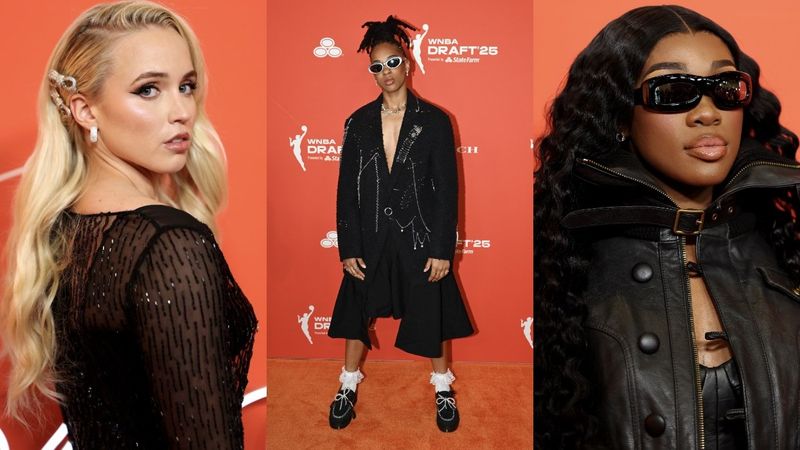
 Cindy Ord/Getty Images
Cindy Ord/Getty Images










